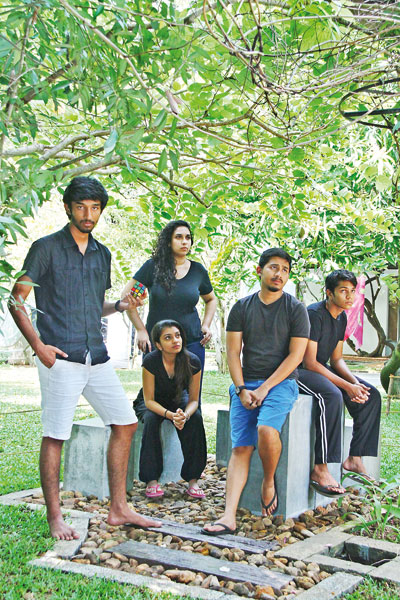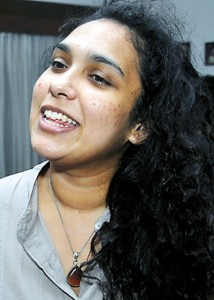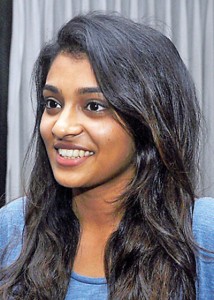Arts
Teen talk: From mundane to sinister

The cast at rehearsals at Sooriya Village. Pic by Indika Handuwala
When Studiolusion presents Enda Walsh’s “Chatroom” next week, the cast will tackle cyber bullying and depression through a motley crew of teenagers. Under the direction of Tasmin Anthonisz, the performance hopes to literally have an immersive effect on the audience, as onlookers sit amongst the cast at the unusual stage- or rather, the dining room of the Sooriya Village.
Much like the unassuming backdrop, Walsh’s script starts off with six teens who meet in a chatroom; only their conversations develop from rabbits and Britney Spears to more dangerous, insidious subject matter.
The lurking sinister vibe of the play comes courtesy of teens William and Eva. Hidaayath Hazeer plays the duo’s mastermind. In the role of the troubled William, Hidaayath leads the pursuit and manipulation of the vulnerable Jim. But playing the sadistic teen isn’t irksome for the likable young actor. “William is bipolar at times”, easily charming his way into the trust of Jim and Eva and naturally emerging as a leader in the group. Walsh’s characters may initially come across as certain stereotypes but have layers that audiences will see as the play unfolds. It’s why Hidaayath’s opinion of the disturbed teen varies- “you’ll feel sorry for him as well.”
A 360º change from William is Jack, played by Joshua Perera. At 16, Joshua is the youngest cast member and plays the mellowest of the lot. The carefree, always joking (“his jokes are really bad” Joshua warns) Jack is described as the “dumb guy”. But playing the class clown in the intense drama doesn’t mean Jack lacks depth. “He’s an honest, nice guy,” says Joshua, and enjoys playing a character with “nothing to hide.” Unlike the others, you won’t get to see his complex backstory. But when it comes to the play’s entertainment, he is a clear winner. What makes this simple character interesting? “Jack is ‘Jack’ ” Joshua adds- the only character that goes by his real name.
If Jack is the play’s goofball, Emily is the “girly girl” describes Dinara Punchihewa. “When you see her she looks like she has everything going for her,” but like the other characters, there is more to Emily than meets the eye. A teen struggling with body issues, the shy, soft spoken Emily “doesn’t like to talk for the sake of talking,” Dinara reflects. For the young actress cyber bulling is almost inevitable. “Everyone experiences it in some form.” The freedom of being faceless and nameless in a chat room “lets you be brave” she adds, but that comes with its own set of dangers.
One character who can adhere to the above is Jim. Played by Shazad Synon, Jim initially comes into the play hauling a lot of personal baggage and looking for support, which he finds in the wrong people. When he first got the part of the isolated teen, Shazad knew he was heading for an emotionally challenging role. An over-thinker with a rough family background, Jim, he says is “nice, slightly naïve and accepting of anyone”. Although he enters the play as a lonely youngster, looking for answers “he finds himself through the others.”
Jim finds an ally in Laura. A neutral character with a past not unlike his, she is “an evolved version of Jim”. Playing the wise and mature Laura is a drastic change for Savera Weerasinghe who grew up playing the mean girl or “one of the boys” in school productions. Together with Walsh’s complex teens and the director’s vision, “there is an evolution of the characters” with Laura at the top. Initially, “I didn’t know what she was like” Savera admits with regard to Laura’s non-committal nature. But under her calm surface is a story similar to Jim’s. We see it only when she is pushed to her breaking point .Only now, “she’s come out of it. She sees the beauty of life”.

Savera Weerasinghe
If Laura is Jim’s protector, Eva is William’s accomplice in making him the sacrificial lamb of their angsty teenage ‘cause’. When Keshia de Soysa started reading the script “I didn’t like her”. “There’s not an ounce of niceness to her,” says the ironically sunshiney Keshia. Whether she’s always teasing Emily, egging on William or fighting with her own mother, it becomes clear that Eva’s constant anger and bullying is a cover up for an inferiority complex while class rifts may add to her frustration.
These days Keshia’s biggest challenge is to control her irrepressible smile in between scenes. But the experience of “Chatroom” has been an awakening. “We’ve all been these characters” she explains. “It incites us to think a bit more, to be more aware.”
Studiolusion presents Chatroom by Enda Walsh on April 6 and 7 at Sooriya Village. The play is in support of Sri Lanka Sumithrayo. Tickets are available online on takas.lk

Shazad Synon

Joshua Perera

Hidaayath Hazeer

Keshia de Soysa

Dinara Punchihewa. Pix by Ranjith Perera
Correction
In the article on “Chatroom” in last week’s Magazine, it was mistakenly stated that Tasmin Anthonisz had directed the productions of “Dead Man’s Cell Phone” and “Time and Motion” by the Theatre Junction. Anushka Senanayake directed the plays and chose the scripts and Tasmin was a part of the productions as a cast member. The error is regretted.

